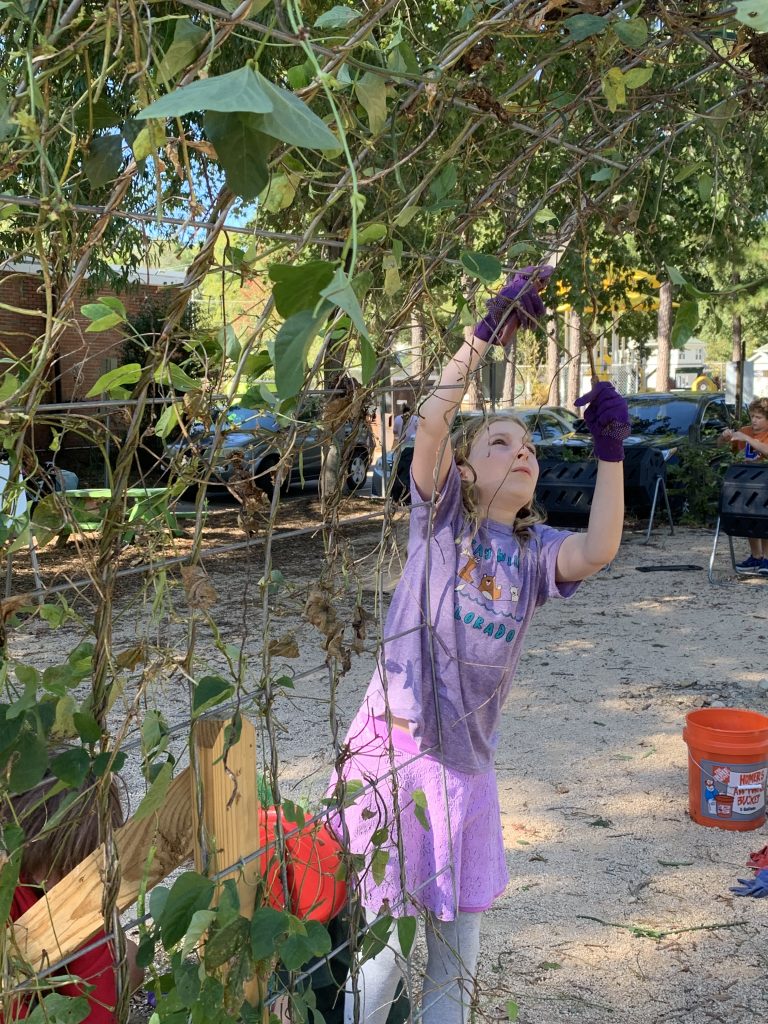Funds grow innovative solutions across Durham
A seed library where residents can exchange vegetable seeds and plants in Lakewood. A farmer’s market designed for teen shoppers in East Durham. An industrial worm-composting operation in North Durham. These are just three of the creative programs local organizations are implementing to help residents facing food insecurity, with the help of financial support raised by Duke’s Doing Good Employee Giving campaign.
Durham organizations tapped Duke Doing Good funds to fill summer gaps

More than thirty thousand dollars were distributed to Durham organizations in direct response to current community needs. Several of the organizations used the funds to help close the summer meal gap for families facing food insecurity, which arises when school food programs are not easily accessible during summer months. For example, the Diaper Bank added fresh food to its community distributions, and Triangle Double Bucks provided families in food assistance programs additional fresh food purchasing power.
The summer is also a precious window for reaching students with nutrition education and skills development. For example, echoReverb piloted “Harvesting Hope,” a farmers’ market by and for teens that rotated through eight locations during the summer. With support from volunteers and staff, the teens shopped the market and learned how to prep and cook the different types of produce and food items available. Each week, students take away important nutrition, food prep and food safety skills, along with their two prepared meals and other ingredients.
Grant recipients emphasize collaboration and capacity building
Scott Brummel, Assistant Director for Food and Nutrition Security of Duke Community Affairs, shared, “We prioritized opportunities with multiple organizations to highlight the connectivity and collaboration of our community partners to building lasting food security solutions.”
Case in point: echo enlisted the help of Durham Public Schools, ReCity Labs, DINE, Interfaith Food Shuttle, and Brightwood Farms to create their teen farmers’ markets. BaggingIt4Kids is also a big collaborator and community builder. The group used a Doing Good grant to support the organization’s #DurhamEats2024 initiative, a series of food distribution events to help address hunger in the community while providing coordination and comradery among Durham’s mutual-aid food organizations.
The importance of an ecosystem approach
With almost 12% of Durham County residents, including a disproportionate 39% of Hispanic and 15% of Black residents (according to Partnership for a Healthy Durham), experiencing food insecurity, immediate access to meals and ingredients is vital. At the same time, bolstering the end of the food chain is just one part of the solution.

“Strengthening food systems requires increasing equity and resilience in our farming and food production, as well as its distribution,” said Brummel.
That’s why Duke supports Bull City Woodshop’s (BCW) work with the Central SW Durham Seed and Plant Library, a mutual aid effort encouraging home gardening. The executive director of BCW Andrea Bowens met with Durham stakeholders to design the improved seed and plant exchange station in Central Southwest Durham.
“Duke has been a great partner,” said Bowens. “This project is helping us do outreach in the community.”
The resulting roadside structure is open to the public for community members to share seeds, seedlings, plants, and gardening supplies amongst one another. It aims to expand access to homegrown fresh produce.
Another funds recipient, Other America Movement, is also working to build local food independence. This farmstead is building a dual processing and classroom facility where local produce can be cooked and preserved. The project will also increase the availability of locally-sources products for community members. Doing Good funds are helping complete the project, which was initiated with a Durham County Agriculture Economic Development grant.
“The building will serve as a hub for educational programs, workshops, and community events, bringing people together and fostering a sense of community pride and collaboration,” said OAM Founder and Director Sheddrick Gibbs. “Overall, this value-added production building can contribute to the overall well-being and resilience of the community.”
“Ultimately, we are one interconnected community, and the Doing Good campaign is a great illustration of this.”
Scott Brummel, Assistant Director for Food and Nutrition Security of Duke Community Affairs
Concluded Brummer, “Duke employees are supporting their neighbors who are also working together to improve the quality of life for all of us living, working, and playing in Durham.”




